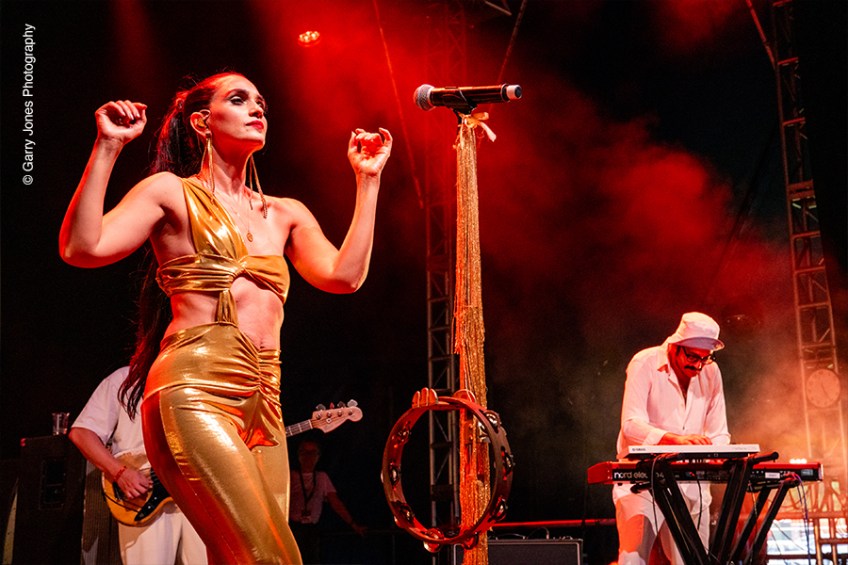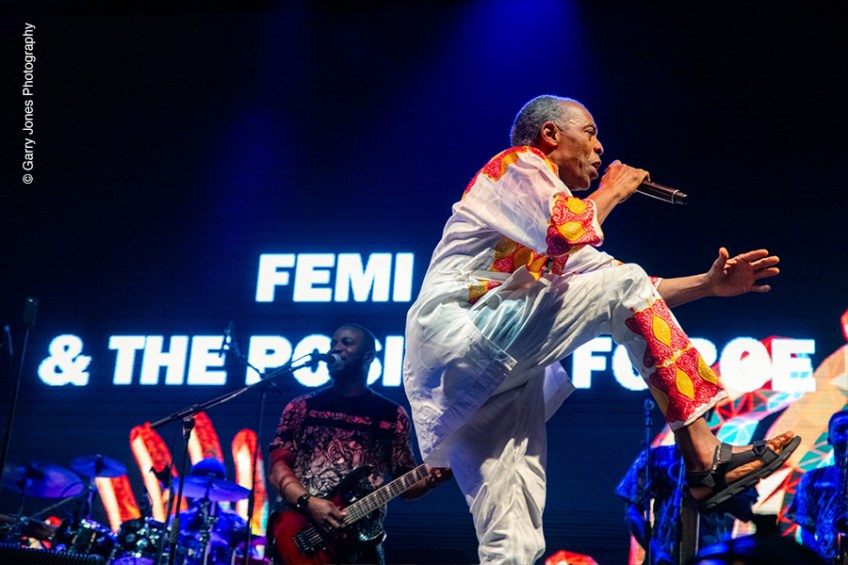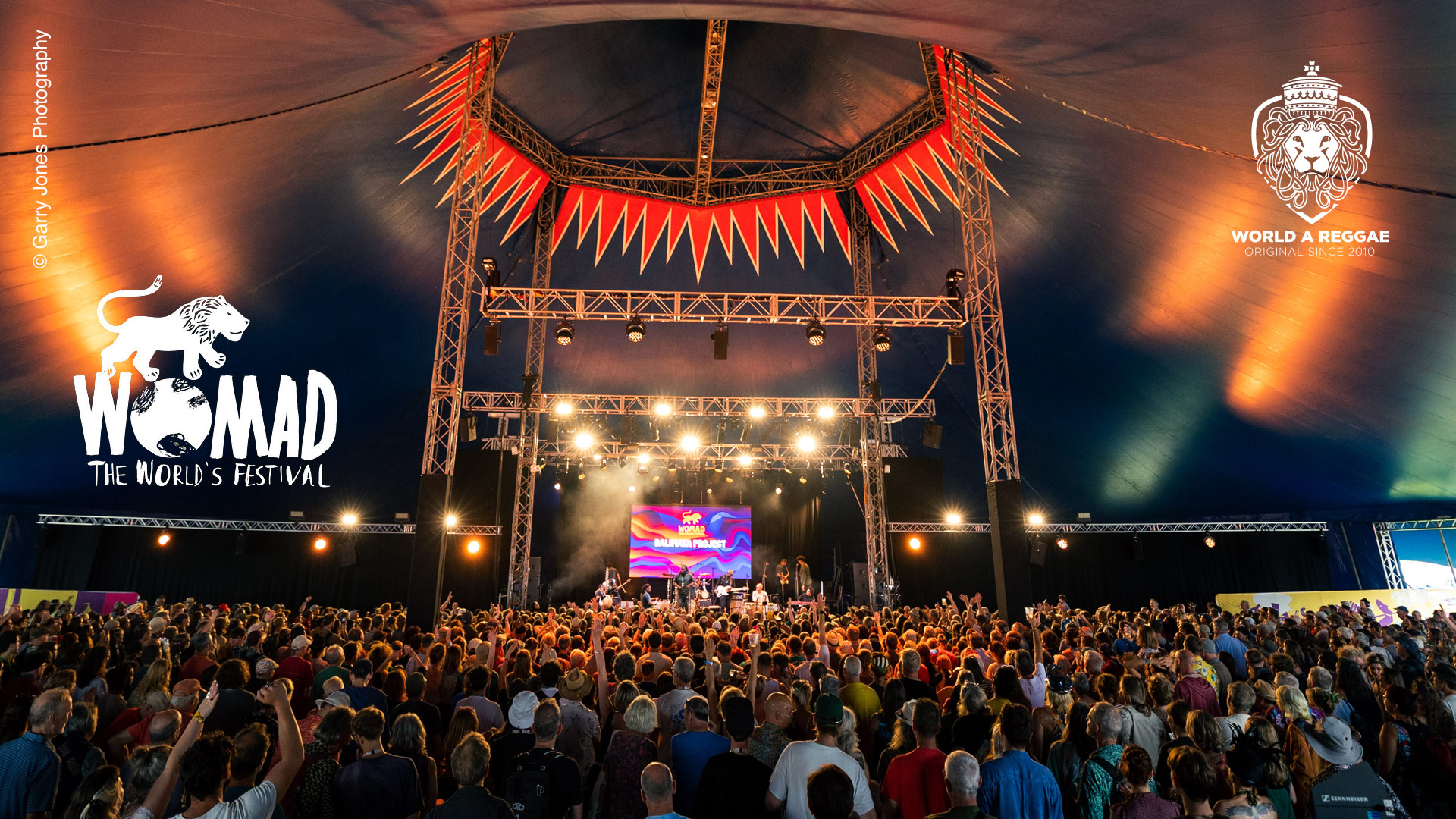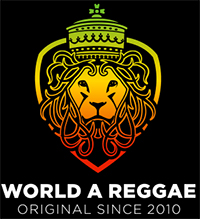By David Katz
Founded way back in 1982 by Peter Gabriel to showcase the music, art, and dance of performers from all corners of the world, WOMAD has become a cherished institution whose countryside festival is one of the highlights of the English summer. Professionally run by a very committed and competent team with several stages in different areas, a tight running schedule that means no downtime nor audio bleed-through, and with peripheral sites offering poetry readings, cooking sessions with performers, and political and environmental activism, WOMAD remains a unique entity on the festival circuit with a relaxed and inclusive atmosphere.
This year’s event faced the additional challenge of a wonky jet stream affected by climate change: as much of mainland Europe faced furnace-hot temperatures and wildfires, post-Brexit Blighty faced torrential downpours, high winds and cold, feeling more like late autumn or early winter than summer. Battling the elements in a soggy soup of liquid mud under bone-chilling winds at WOMAD would surely sway even the most hardened climate-change denier!
My journey to this year’s event was affected by an endless series of roadworks on various highways and motorways across southwest England, slowing traffic to a snail’s pace repeatedly and doubling my travelling time. On-site food vendors had jacked up their prices and slimmed their serving portions, another sign of post-Brexit trade damage and the cost of living crisis. Thankfully, the range of real ales and traditional ciders on offer remained as good and affordable as ever.

I arrived on the Friday in time to catch the Trinidadian reggae artist Queen Omega, backed by her Royal Souls band in the Siam Tent. Wearing a flowing pink outfit crowned with a Boboshanti tiara, Omega took the Barbie aesthetic towards a regal Rastafari direction, and she made a commanding presence on the stage, the highpoints of her set including ‘Natural Melody,’ a well-received rendition of ‘Ganja Baby’ and the forceful ‘Reggae Ambassada.’

I enjoyed the recent album Tusona: Tracings In The Sand by Zimbabwean band Mokoomba, with its riveting four-part vocal harmonies and bright horn lines, yet when they took to the Main Stage on Friday evening, the sound was a lot less polished; the horns were absent and the call-and-response between band members and lead singer Mathias Muzaza was noticeably rougher around the edges. The performance had plenty of energy, but in places they seemed more concerned with their dance moves than making the best use of their instruments, and I’m not sure whose idea it was to play a music video of the group on the widescreen behind them as they played live on stage, but this was another distraction.
Nevertheless, their hybrid style, which is grounded in Zimrock and Chimurenga, but heavily influenced by Congolese sokous, sets them apart from their contemporaries and songs like the spiritual ‘Naynsola’ sounded excellent and garnered a strong crowd response. The band were in a generally buoyant mood, having last played WOMAD ten years ago.

Having caught a bit of Sao Paulo rapper Emicida’s jagged set in the Siam Tent, more sonic frights awaited at the D&B Sondscape Tent with Snapped Ankles, an anonymous British act clad in strange face-obscuring costumes, banging out all kinds of screeching noise while a seizure-inducing video feed lurched behind them. An assault on the senses, which strangely appealed.

Saturday was the best day weather-wise and under bright sun with a hefty breeze, Dele Sosimi’s Afrobeat Orchestra set the tone on the Main Stage in the early afternoon, his take on Afrobeat relatively relaxed, yet still compelling, his years as a keyboardist in Fela Kuti’s Egypt 80 band serving well as the foundation for his longstanding project, which he commands with competency and grace. Orchestral Qawwali in the Siam Tent came next as an unexpected highlight. Taking the Qawwali devotional music of Pakistan and blending it with orchestral string arrangements was an excellent idea and musical director Rushil Ranjan pulled off the merging so seamlessly, singer Abi Sampa’s delightful voice a captivating focal point. The musical excellence was of the highest calibre, and I was surprised to learn that the project has only been running for about three years; do not miss them if they come to your area!

After enjoying Cha Wa’s take on the Mardi Gras traditions of their native New Orleans on the Main Stage and the strange mutations of traditional Japan music by Ajate in the Saim Tent, I opted out of Fado star Mariza’s Main-Stage delivery in favour of the Iranian-Israeli singer Liraz in the D&B Soundscape Tent. Together with the brave Iranian band who backed her on two excellent albums, Liraz sang songs that reflected her dual heritage, and which expressed her solidarity for the women of Iran, who face terrible restrictions under the current regime. Her messages are about freedom of expression, personal agency, and the ability of Mankind to overcome divisions – an inspiring set with musical distinctiveness.

In the Siam Tent, Ghana’s Alogte Oho and His Sounds of Joy was billed as a gospel group, but spiritual Highlife is probably a better description; in any case the keyboards, brass and female harmonies backing Oho helped to round out the sound, which built to a steady crescendo as the evening progressed.
One unfortunate aspect of the programming is that, with so much on offer, one inevitably needs to choose one space or the other and at that point, I opted for a bit of Palestinian trio 47 Soul on the main stage, but at the expense of fellow Palestinian Reem Kelani at the Ecotricity Stage. Then it was time for a trek to the Museum of the Moon, a hidden space in a forest with a giant illuminated replica of the lunar body, where Peter Gabriel’s album i/o was playing in sense-surround stereo – a beautiful way to end the day.

Sunday’s abysmal weather mean that I missed sets by Staples Junior Singers, Suriname’s Saramaccan Sound and Brazil’s Lia De Itamaraca, but when I reached the Charlie Gillet Stage I was blown away by Star Feminine Band of Benin. It was staggering to think that the drums were played by a fourteen year old schoolgirl who had already fully mastered her instrument, blazing past John Bonham territory; the bassist was of a similar level of musical competency and at times played her instrument upside down, behind her head. The guitarist was equally rocking, the keyboardist and bandleader played sprightly chords on a Vox Continental and the two percussionist threw their instruments back and forth during the
set – all very entertaining. And if the lead singer seemed a bit unsure of herself as a frontwoman at times, it was only a slight detraction; this group shows plenty of promise and the energy they conjured lit up the crowd.

Horace Andy’s performance on the Main Stage was the truly outstanding moment of this year’s WOMAD. Backed by the revered Dub Asante band with the Matic Horns adding an extra layer of musical excellence, Horace kept things positive and upbeat throughout, beginning with a chilling take of ‘Earth Must Be Hell’ and the eerie ‘Spying Glass,’ before moving on to his rendition of ‘A Quiet Place,’ first made famous in Jamaica by the Paragons.

A rollicking ‘Fever’ gave way to the emotive ‘Problems’ and the punitive blast of ‘Money Money,’ ‘Zion Gate’ driving us deeper into roots territory. ‘Dread A No Style’ ushered us briefly into dancehall before ‘Every Tongue Shall Tell’ brought us back to roots, the trombone work of Henry ‘Buttons’ Tenyue beautifully framing the song, before top-notch cuts of ‘Skylarking,’ ‘Cuss Cuss’ and ‘Ain’t No Sunshine’ gave us the best of what Horace Andy has to offer. ‘Big Wheel,’ which Horace recorded with Massive Attack, was here delivered in a straight-up reggae fashion, and ‘Leave Rasta’ from the In The Light album was a fitting closer. Thank you, Horace Andy and band, for an excellent performance!
Following a bit of Japanese psych trio Kuunatic at the Charlie Gillett Stage, it was time for some rare grooves in the Disco Bear Tent from John Stapleton, a mainstay of the Bristol DJ scene; John often plays vintage reggae but on this occasion he was hitting us with rare African treasures, little-known dance grooves from Ghana and Nigeria, in preparation for closer Femi Kuti on the main stage.

Femi and his Positive Force kept their anti-corruption attacks on the upbeat, zooming their take on Afrobeat to lightning speeds. Femi often finds his best musical expression on the alto saxophone, but on this occasion, he spent more time berating politicians on the mic and running his arm up and down a centre-stage keyboard, as three full-figured women shook their stuff, stage left. With an eye on the clock and a frigid chill in the air, the performance wasn’t quite stellar, yet remained engaging, rendering this closing set between bang and whimper. And then it was an inevitably long trudge through deep mud to leave the site.

Despite such climatic challenges, WOMAD remains a place of discovery. You are guaranteed to hear acts at this festival that you won’t encounter anywhere else, and the inclusiveness and professionalism with which the event is run maintains its appeal, whatever the weather. Let’s just hope for more sunshine next year!
By David Katz


